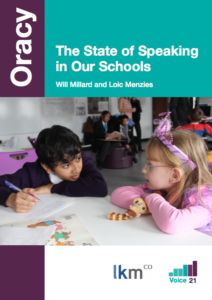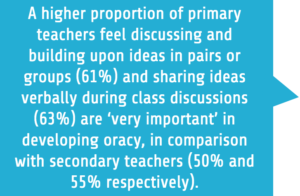Building pupils’ voices
8th November 2016
We have a breakdown in communication on our hands
 Today Americans vote following what must be the most negatively fought and acrimonious presidential race in living memory. Whoever triumphs, large portions of the US public will be left feeling angry and alienated. On this side of the Atlantic, as the UK constitutionally implodes, it is difficult to resist making comparisons between factors that have contributed to our own sorry state of affairs, and those playing out in the States. In each case a widespread sense of disempowerment propelled by inflammatory political campaigns has produced toxic levels of mistrust, and a breakdown in meaningful communication between those with opposing views. Against this backdrop, teaching pupils to articulate themselves confidently and listen carefully could not be more important. As we argued here, schools have an important role to play in giving pupils a strong foundation in general knowledge about politics and current affairs. They should also, as we suggest in today’s report, give oracy (learning to talk, and learning through talk) the same status as literacy so that pupils can confidently and competently articulate themselves.
Today Americans vote following what must be the most negatively fought and acrimonious presidential race in living memory. Whoever triumphs, large portions of the US public will be left feeling angry and alienated. On this side of the Atlantic, as the UK constitutionally implodes, it is difficult to resist making comparisons between factors that have contributed to our own sorry state of affairs, and those playing out in the States. In each case a widespread sense of disempowerment propelled by inflammatory political campaigns has produced toxic levels of mistrust, and a breakdown in meaningful communication between those with opposing views. Against this backdrop, teaching pupils to articulate themselves confidently and listen carefully could not be more important. As we argued here, schools have an important role to play in giving pupils a strong foundation in general knowledge about politics and current affairs. They should also, as we suggest in today’s report, give oracy (learning to talk, and learning through talk) the same status as literacy so that pupils can confidently and competently articulate themselves.
Our new report is the first of its kind, synthesising a wide range of existing research on oracy, and using exclusive survey and interview data to examine teachers’ understanding of and engagement with oracy. It finds that while teachers believe oracy is critical for pupils’ academic and personal development, their engagement with it is limited by a lack of time, confidence, and prioritisation of written work.
Oracy should have the same status as literacy
Today the research feels most relevant, to me, because it highlights how oracy (when used well) can build pupils’ sense of voice and self-worth, improving their willingness to share their thoughts and helping them listen to what other people are saying better. Research shows that oracy-based teaching strategies (such as purposeful classroom dialogue and debate) help pupils learn to speak with greater confidence, promotes their understanding of social issues and differences between social groups, and allows them to explore differences of opinion through more effective listening.
We argue that schools should give oracy the same status as literacy, not only because of its academic benefits, but because it gives pupils a voice (both literally and figuratively). If we achieve this, perhaps political discourse in the future will be more constructive, and people’s engagement with it more positive.
Ways forward
One step we should take is to encourage teachers to visit different school phases, to observe how oracy works with pupils in different age groups.  Secondary teachers stress the relative importance of presenting and debating in oracy, and might benefit from observing oracy in primary schools where the emphasis is more on exploring ideas through discussion, and oracy is often used across the curriculum. Early Years teachers are also highly skilled at developing pupils’ language and communication, so primary teachers could learn a lot from the methods used with these younger children.
Secondary teachers stress the relative importance of presenting and debating in oracy, and might benefit from observing oracy in primary schools where the emphasis is more on exploring ideas through discussion, and oracy is often used across the curriculum. Early Years teachers are also highly skilled at developing pupils’ language and communication, so primary teachers could learn a lot from the methods used with these younger children.
Another step would be to provide more opportunities for pupils to practice oracy outside the classroom. For example our report highlights a number of activities taking place in schools, including:
- ‘Sharing Assemblies’ at Ascot Heath CE Junior School in Berkshire, where pupils prepare and give a five-minute presentation about something that’s important to them. They do this in front of the whole school.
- The Woolsack Debating Society in Bradford, created by and for local primary schools. Pupils practise debating skills in lessons, and can then take part in debates against teams from neighbouring schools.
- All staff, including the caretakers and kitchen staff, use a common language for learning at Limpsfield Grange School in Surrey, which helps scaffold pupils’ interactions with adults and peers wherever they are in the school.
- Several schools we spoke to encourage pupils to prepare presentations on their learning strengths and areas for development at Parents’ Evenings.
If you are a teacher and interested in finding out more about oracy, our report is a great place to start. So too is the information available through Voice 21.

Comments